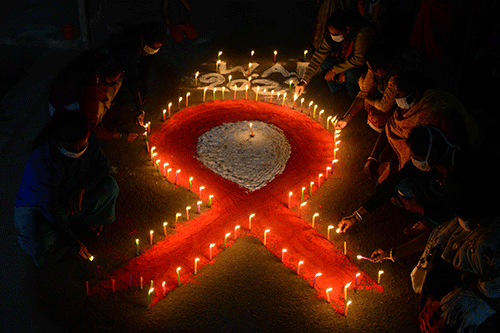While HIV/Aids remains a major public health issue, Namibia appears to be stemming the tide of the epidemic, commentators said this week.
Although the country has done well in reaching its targets of making sure that a large population is aware of their HIV status, UNAIDS has admitted that some groupings are not benefiting from this success. This was shared by UNAIDS fast-track advisor Puleng Letsie during a talk show on NBC television this week.
She said although the country has done extremely well in achieving the United Nations targets, certain clusters of the population are left behind. Namibia has reached HIV fast-track targets of UNAIDS by ensuring more than 90% of people living with HIV know their status and are on treatment while their viral load is suppressed.
“Even though the country was one of the first to achieve the target before the 2020 deadline, the success is not uniform across the population groups.
Some population groups do not benefit from the success. These are usually young people, children and key populations,” said Letsie.
The world will today observe World Aids Day under the theme: ‘End inequalities. End AIDS’, which emphasises a special focus on reaching people left behind in the battle against the epidemic. As it currently stands, according to information by the health ministry, 90% of Namibians do know their HIV status, 98% are on treatment and 91% have durable viral load suppression. “That success is for the overall population but these groups are very low in terms of knowing their status and being on treatment.
Young people and children on treatment are around 60%. We must weigh so that all the key populations can join the success,” she stated. According to her, key populations, include people who are vulnerable to HIV because of certain circumstances, people who are at high risk of acquiring HIV including the LGBTQI+ community, those who are in the lower quintals and economically disadvantaged and those who do sex work. US embassy chargé d’affaires Jess Long said Namibia is a global leader in constantly pushing forward to reach new audiences and making sure strong health systems exist not only for HIV but other pandemics. The US government, through the President’s Emergency Plan for AIDS Relief, has earmarked US$90.4 million (over N$1.3 billion) for 2022 towards Namibia’s fight against HIV. This increase from US$89 million contributed in 2021 aims to intensify the country’s efforts to reach epidemic control of HIV. “We have spent more than US$1.6 billion with Pepfar programme in Namibia since 2005 and this is money taken from the US taxpayers and the purpose of that is to save lives and advance global health security. If we aren’t doing effective programmes, we are wasting money and risking people’s lives,” said Long.
Covid-19 and HIV
With a 12.2% HIV prevalence rate in Namibia, Letsie said Covid-19 has changed the dynamics such that resources, including human resources, were shifted. “HIV and other health issues and services were sort of disrupted. Linking this to almost 40 years of dealing with HIV, we have learnt great lessons. The great lessons learnt from HIV are now being used for Covid-19,” she said, citing community-based services, strategic information, surveillance, documentation and contact tracing as some examples. Long has also praised the concerted efforts of the ministry of health, community members and the Pepfar programme in ensuring a large population has access to treatment. “There was a lot of thought put into this, increasing concrete-like access to medication and multi dispensing, so somebody has to only come once and get six months of medication instead of coming every month. There have been instances where one person in a community group gets medicine for many people at one time and the next time somebody else gets it,” stated Long. Health ministry official Jacque Kamangu admitted the Covid-19 pandemic disrupted HIV-related programmes.
psiririka@nepc.com.na


